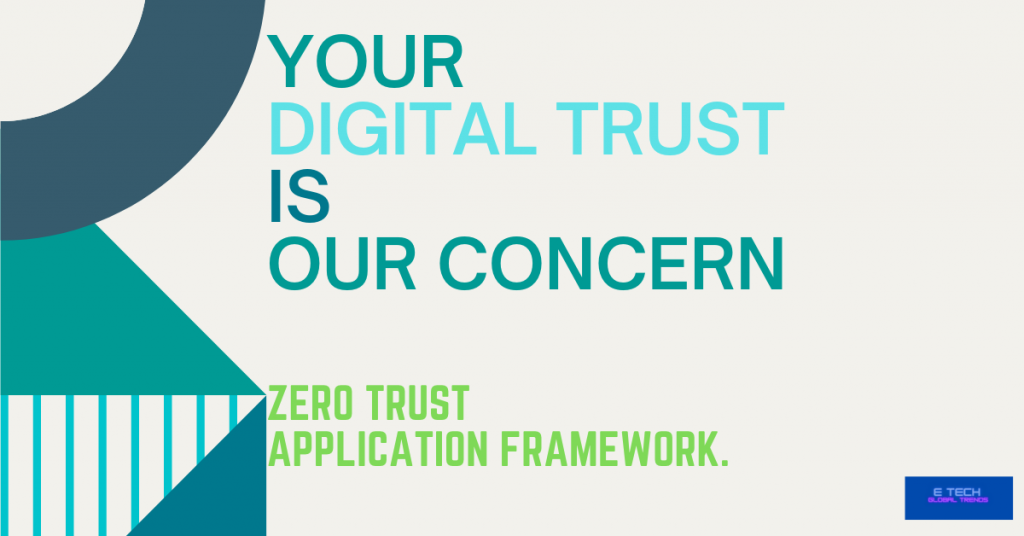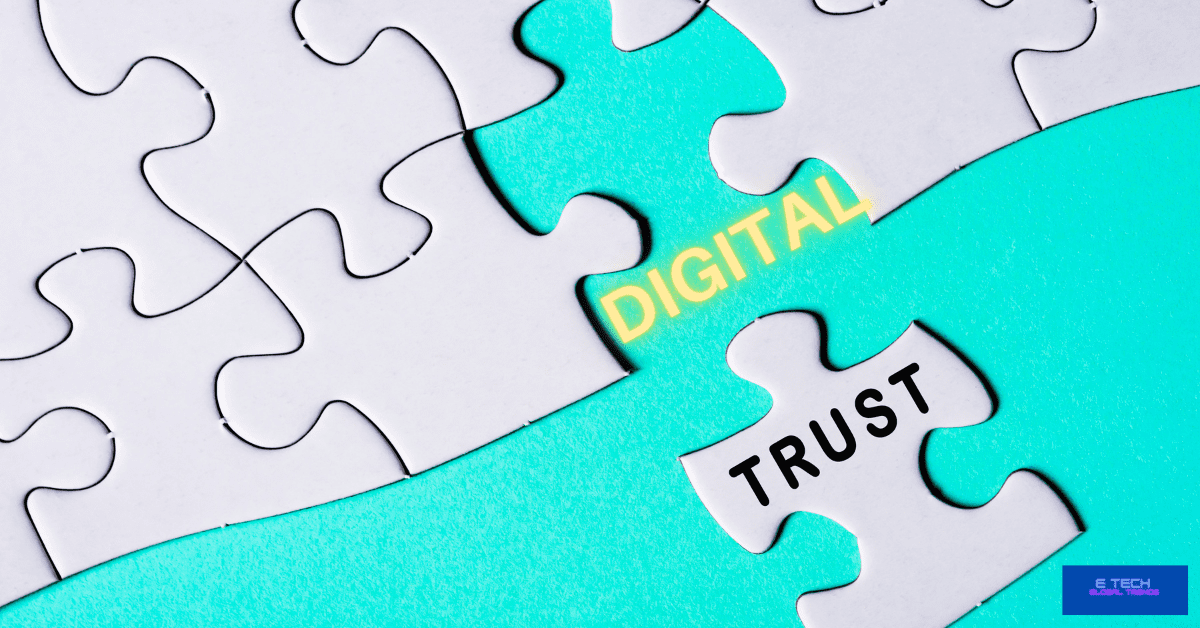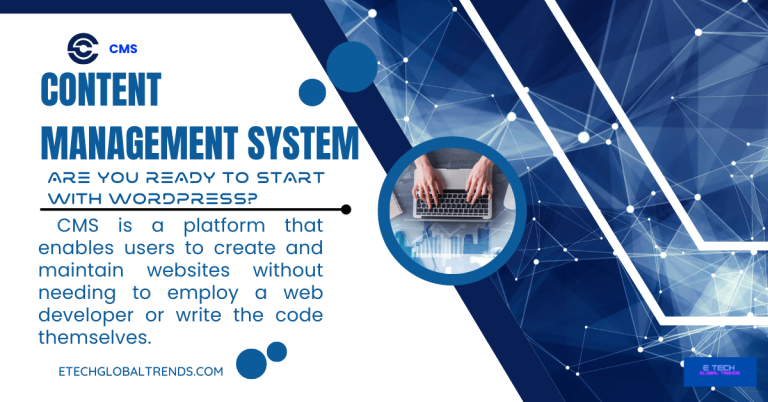Digital Trust
No internet place is 100% secure! Many articles in Etechgolbaltrends as this site made explanations in this regard. of course, no home is secure in the same way. Do you leave your home? Like that, we have to make it possible. Let’s get to know insights on digital trust.
What is Digital Trust?
Digital trust is the belief that individuals have in technology, businesses, and organizations to protect their sensitive and private information. In the digital era, it is crucial to create solid and long-lasting ties between people, organizations, and society at large.
Digital trust has emerged as a crucial issue in the modern world, as we rely largely on digital technology for transactions, communication, and the storage of personal information.
Consumers must have faith that their personal information is safe and won’t be abused, managed improperly, or compromised.
Digital trust involves more than simply protecting personal information. it also entails guaranteeing the dependability and authenticity of digital services & information.
What are the major components of digital trust?
- Regulations governing data protection
- data breaches,
- privacy practices, and
- the standing of businesses and organizations
are some of the variables that might affect digital trust. Customers are more inclined to trust businesses that are clear about their data-gathering methods, have strict data protection rules, and haven’t had data breaches than those that have encountered security incidents or been discovered to be improperly handling user data.
On the other hand, solid data protection regulations, open data gathering procedures, and dependable digital services all contribute to building digital trust, which is a critical component of the digital era.
Individuals and organizations may take use of the advantages of the digital world while reducing the hazards related to digital technology by developing digital trust.
Why digital trust is more crucial today?
We are already operating in a digital environment. those whose businesses are not growing and becoming digital are simply attempting to catch up. And the key differentiators in this context are data-driven technologies like;
- cognitive computing,
- intelligent automation, and
- artificial intelligence (AI).
But, when systems, computers, as well as algorithms start to have a bigger impact on financial institutions’ daily decision-making, many CEOs & managers as well as regulators and boards are starting to question whether they can trust the data and analysis that the machines are producing.
What does computer technology for digital trust entail?
There are several definitions. All are correct and the explanation comes on usually for the relevant task.
To assist assure;
- the security,
- privacy, & integrity of digital information and transactions,
- several techniques,
- systems, and tools
are referred to as “digital trust technology.” Together with more sophisticated technologies like;
What does include digital trust technology?
Computers’ use of different security tools and technologies to build trust and ensure safe communications between people, networks, and devices is referred to as “digital trust technology.” These can involve authentication techniques like;
- biometrics,
- encryption
- digital certificates
Digital trust technology examples include:
- Data is encrypted using Public Key Infrastructure (PKI), which employs digital certificates to verify the identities of people and devices and uses encryption to prevent data from being intercepted or altered.
- Two-factor authentication (2FA), which provides an additional layer of security by asking a user to submit two kinds of identity, such as a password as well as a fingerprint or even a security code delivered to a phone, is one such method.
- Biometric authentication verifies a user’s identification by using distinctive physical traits like fingerprints, face recognition, or voice recognition.
What connection exists between hardware and cyber security?
The basis for digital trust is hardware. Instead of software that is loaded on the hardware of a computer network, security measures are vulnerability prevention that is provided by a physical component. A scanner or network traffic monitor are two examples of hardware security-related equipment.
As security measures are founded on the rules of physics, cybersecurity just at the signal level is an intriguing strategy. It makes it impossible to transport data in the incorrect direction, preventing an attacker from accessing your system.
Furthermore, robust software security immediately protects the functionality of internal & operational software itself.
Security software is a prerequisite for cybersecurity hardware.
This computer application aids in enhancing the general security of networks, systems, and data. It aids in defending the computer system from threats such as;
- incursion,
- illegal access,
- hacker assaults, and
- other dangers.
Security breach prevention is expensive and irritating. The secret is to implement procedures that assist reduce risks while providing protection and using tools for security testing.
Partnering with an IT management solution opens up new opportunities for your IT staff to engage clients while boosting productivity and efficiency within the company.
Why do we suggest the Zero Trust Application?
To protect users from dangerous online risks like data breaches, the Zero Trust Monitoring system needs reliable technology to provide only authorized and verified network access.
Access to zero-trust applications is available via zero-trust technology.
It guarantees strong security while offering unified, single-click access to all your business apps, wherever they may be.
the following advantages of Zero Trust access management security on your company

- Your IT infrastructure is blackened and strengthened. On the basis of “need to know,” it offers secure application access.
- It only permits access to authorized and trustworthy devices thanks to its Zero Trust Application framework.
- Offers fine-grained insight into every user’s activities and enables you to see who is using which applications.
- Lowers the attack surface & safeguards important data.
- Prevents traffic backups and guarantees a good user experience.
These technologies aid in making sure that the delivery of sensitive data will keep secure. and then only individuals with authorization have access to it.
To defend against cyber threats and malicious assaults, they can employ some applications, including;
- online banking,
- e-commerce, &
- cloud computing.
- biometric verification and
- blockchain,
this can also incorporate measures like;
- encryption,
- access restrictions
- authentication,
The objective of digital trust technology is to provide a high degree of confidence in the;
- dependability
- security of digital systems and networks
- protect against various types of cyber threats and assaults.
What is the most effective technique to foster online trust?
Digital trust is a process that takes time to develop.
It necessitates;
- diligence,
- patience, and
- attention to detail.
Moreover, it requires something exceptional from your consumers. Before they put their belief in your abilities, they must have faith in your goods.
When you have these elements, maybe—just maybe—you’ll have a chance to build the digital trust that is the soul of any firm.
What does computerized digital trust technology entail?
Digital trust technology describes the numerous techniques for securing and relying on computers and computer systems.
This involves utilizing a range of tools and techniques to guard against security risks including;
other types of assaults.
Digital trust technologies include,
for instance:
1. Encryption
encoded data in the procedure. so that only a person with the right decryption key may access it. Both data at rest and data in transit.
For example, when it is transferred over the internet. are protected by encryption. Especially the data stored somewhere else.
2. Firewalls
A firewall is a type of network security device that monitors and restricts network traffic according to established security rules. Firewalls can be hardware-based like a specific physical device or applications a program installed on a computer.
2. Authentication
This refers to the process of confirming that someone is who they say they are. In the context of online trust technology, authentication frequently entails the use of usernames, passwords, as well as other types of credentials to prove a user’s identity.
4. Standard security protocols
to ensure the security and integrity of data & systems by adhering to these defined norms and principles.
- HTTPS: Hypertext Transfer Protocol Secure, is a protocol used for secure communications over the internet,
- SSL: Secure Sockets Layer, which will protect data transfer between a client and a server,
are a few examples of security protocols.
3. Access control
This describes the processes used to deny access to specific resources or parts of a system.
For example, a firm may use network access to restrict which employees have access to specific files or data.
Ultimately, digital trust is an essential component of computer security since it works to defend against risks to the;
- availability,
- confidentiality, and
- integrity
of data & systems.
As a wide use of technology, AI applies much more often, what is AI’s role in digital trust?
Well, of course, yes. In 2023, organizations will be concentrating on these 3 key AI topics. Based on our interactions with iTech. The encounters they have with both current and potential US business clients are the basis for this.
- AI in investment: The majority of corporations will prioritize investing in AI. According to the Forbes research group, real-time use models will alter machine learning technology stacks that have traditionally relied more heavily on historical data.
- Ethical AI: More laws and rules are emerging in the ethical usage of AI to safeguard people.
- AI and blockchain technology: To boost digital trust, AI and blockchain technology will be applied more frequently.,
How does excellent digital trust make more business?
when Customers have a better incline,
- they will tend to buy from you.
- refer you to their friends, and
- return for more when they have faith in you.
when Customers have a better incline, to conduct business with a firm when they believe they can trust it with their personal information.
Certainly, loyalty and satisfaction of Customers will lead to businesses that take measures to establish digital trust with them by protecting consumer data. and being open about secure use.
when Customers have a better incline, to refer a business to others if they feel confident.
Can you truly trust digital currency?
While it is important to keep in mind that no speculation is entirely secure. there is a certain degree of risk also for cryptographic types of currency.
But, they have also proven to be a profitable bet for certain people in the present. As opposed to corporate shares, where a variety of equities are available to constantly confound us, interests in cryptocurrencies are not quite as sophisticated.
To invest in, PlatinX is the greatest digital currency. their digital asset, built on BNB Blockchain technology, provides holders with a risk-free means of investing and increasing their wealth.
Making ensuring your website is safe is the first step in establishing digital trust with clients.
Using a trustworthy security certificate will enable you to achieve this.
such as a certificate with Extended Validity (EV). A valid company ownership and an EV certificate will operate the website.
Also, you may increase trust by ensuring that your website is simple to use and offers reliable information.
Be sure to respond to any client questions or concerns right away. Also, make it simple for consumers to get in touch with you by phone, email, or live chat.
Lastly, be open and honest about your methods and rules.
What do we suggest for software developers?
To accommodate individuals who are entangled in gadgets and technology, faith and trust in digital technologies is a trend.
Another crucial development that will lead to further inventions is the popular digital trust.
People with a digital conviction think that technology can build a secure, safe, and dependable digital environment and assist businesses in inventing and innovating without worrying about maintaining the confidence of the general public.
Certainly, the two main specialties you might look into are cybersecurity & ethical hacking to make the internet a safer place for consumers. You may find a variety of professions in these two, ranging in rank from junior to senior. To pursue a high-paying position in cybersecurity, you don’t have to need a master’s degree or even a certificate. But, you might need to pursue professional certifications for ethical hacking.
Carriers to cybersecurity and ethical hacking
- Security Engineer
- Cybersecurity Analyst
- Security Architect
- Security Automation Engineer
- Penetration Tester
- Network Security Analyst
Conclusion
to sum up, Technology may affect trust in both positive and bad ways. Through facilitating connections, safe communication, and information transmission, some technologies can, on the one hand, contribute to a rise in interpersonal trust.
For instance, internet technologies like social networking, online banking, and e-commerce can make it simpler for individuals to trust one another and carry out transactions without the aid of a middleman.
Nevertheless, because it may use to disseminate false information, aid in cyberattacks, and alter user data, technology can also encourage mistrust.
Hope this content will help!
Cheers!
Read more on related topics; SecOps solution







